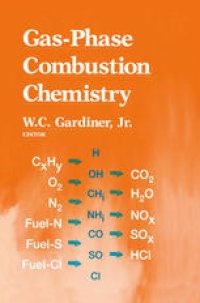
Ebook: Gas-Phase Combustion Chemistry
- Tags: Physical Chemistry, Industrial Chemistry/Chemical Engineering, Atmospheric Protection/Air Quality Control/Air Pollution
- Year: 2000
- Publisher: Springer-Verlag New York
- Edition: 2
- Language: English
- pdf
This book differs from its out of print 1984 predecessorl primarily by lacking theoretical chapters on combustion modeling and elementary reaction rate coeffi cients. While noteworthy advances in these subjects have been made since 1984, it was decided to mention theory in this book only where appropriate in chap ters describing combustion chemistry itself. Otherwise, space limitation would have forced us to discuss only new developments in theoretical areas, thereby abandoning our goal of keeping this book readable by newcomers to the field of combustion modeling. Contemporary modeling and rate coefficient theory as applied to combustion deserve a book of their own. A second omission is a chapter devoted to reviewing the elementary reactions that contribute to the combustion chemistry of hydrogen, carbon monoxide, and hydrocarbon or alternate fuels. Readers looking for guidance to the current knowledge we have in this area will find a broad outline and extensive references to the review and archival literature in Chapter 1, where the essential features of combustion chemistry modeling are surveyed.
This book supersedes Gardiner's 1984 "Combustion Chemistry." It is an updated, comprehensive coverage of the aspects of combustion chemistry that are relevant to gas-phase combustion of hydrocarbons. It includes an extended discussion of air pollutant chemistry and aspects of combustion. The book newly reviews elementary reactions of nitrogen, sulfur and chlorine compounds that are relevant to combustion. Methods of combustion modeling and rate coefficient estimation which have been established during the recent years are presented, as well as access to databases for combustion thermochemistry and modeling.